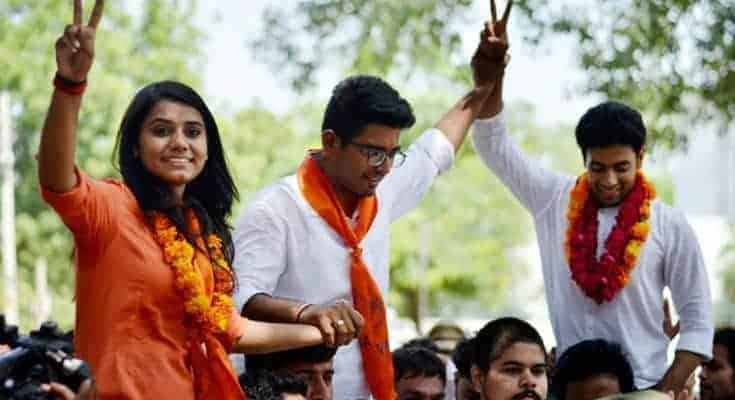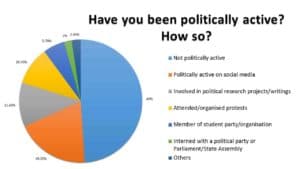In the last part of DU Beat‘s analysis, we look at what the respondents have to say about the role of youth in politics, elements missing from our political culture and some other conclusions.
After having analysed what the University of Delhi (DU) students, mostly first-time voters, had to say about the government, the opposition, the electoral possibilities and what matters to them as voters, our attention is now turned to questions that aim to understand their views about the larger political sphere.
When asked about whether they thought if the youth could influence the politics of the country, almost all respondents answered affirmatively – 71.7 per cent saying “yes, in a major way” and 26.4 per cent selected “yes, but in a limited way”.
A second and related question was whether the respondents had been politically active themselves. Ironically, 49 per cent said they had not.
To give space to respondents to express what they felt about the larger political culture, we asked them what they thought was one major element missing from politics. The responses were not only highly varied, but also threw light on a rather sad state of affairs as brought about by the plethora of shortcomings as perceived by the voter. A majority of them focussed around ideas of accountability, morality and integrity, lack of emphasis on “real issues”, and incompetent leadership and opposition, while some others touched upon the need for a free and strong media and tolerance for dissent. Yet others felt the need for parties to show unity in international matters and put India first.
“Dharm ke sthaan par dharmikta ka chalan,” (The replacement of righteousness by religiosity) wrote Amit Kumar, a student of Shyam Lal College. Shankar Tripathi of Hindu College answered that a “greater acceptance” of student movements, and a safer and workable environment for the same was a missing element. “People take themselves as a subject of government they do not take themselves as a participant in politics,” said Praveen from Dyal Singh College. Some views were rather curious. A student from Kalindi College, who preferred to remain anonymous, said, “Too many rights to common people, they oppose almost every step taken by the government.”
Interesting and varied answers were also given, wherein respondents expressed their general views about the upcoming elections or the political trends – from singular remarks like “NDA>36o”, “Save democracy” and “India should not invite Indira Gandhi Part-2” to lengthy comments.
Namit from Dyal Singh College wrote, “Upcoming elections will be a watershed moment, which will make the picture clear where the country would go in the next 10-15 years. Also, it will be the most difficult election for the grand old party, the Indian National Congress. Eager to see how Rahul Gandhi leads them.”
“The upcoming elections are very crucial not because it is Modi vs rest but because it is choosing between becoming a developed nation or still remain developing. Yes, India is still developing but the pace of development that we have seen in BJP led NDA government is so fast – be it the area of national security, health, education or roads and railways. If now at this point this government is stopped then I believe our graph of development would come down,” wrote Aayushi Agarwal from Shaheed Rajguru College of Applied Sciences for Women.
A student from Hansraj College wrote, on conditions of anonymity, “I don’t know if there has been any work done or not. But one thing’s for sure – I don’t feel secure voicing my opinions now as I did before. And no, I am not anti-nationalist, neither a fan of Congress.”
Conclusions
To conclude, it is quite clear that everyone feels a lot is riding on this election. For some, it is about deciding what and how India and its democracy would be going forward; for others, it has got to do with sustaining what has been done in the past five years. In any case, the election is important.
There is also a near-universal realisation that voting based on caste and religion or emotive issues isn’t desirable and that greater emphasis on more pressing issues is necessary. At the same time, there is also an acknowledgement of the absence of that tendency in the current political and electoral scenario.
Image credits-
1. Cover- DU Beat archives
2. Graphs- Palak Mittal for DU Beat
Prateek Pankaj
prateekp@dubeat.com







Comments are closed.